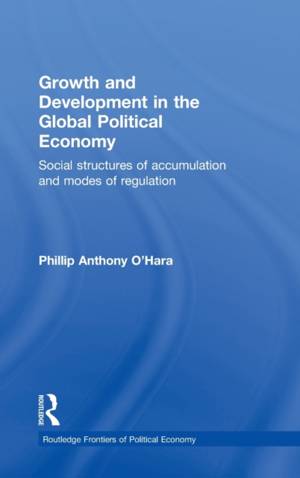
- Afhalen na 1 uur in een winkel met voorraad
- Gratis thuislevering in België vanaf € 30
- Ruim aanbod met 7 miljoen producten
- Afhalen na 1 uur in een winkel met voorraad
- Gratis thuislevering in België vanaf € 30
- Ruim aanbod met 7 miljoen producten
Growth and Development in the Global Political Economy
Modes of Regulation and Social Structures of Accumulation
Phillip O'HaraOmschrijving
Recent institutional changes have seen the increasing dominance of globalization and neoliberalism in the world economy. As markets have been deregulated, privatization and unproductive government spending have been promoted. Yet the greater volatility of capitals, the emergence of many financial crises, a decline in trust, and environmental problems have cast doubt on the effectiveness of neoliberal globalization.
This book studies the impact of neoliberal globalization on growth and development in the world economy. It scrutinizes whether new social structures of accumulation or modes of regulation have emerged to promote long-term socioeconomic performance in the global economy during the early years of the twenty-first century. Special reference is given to the specific performance of neoliberal governance; transnational corporations; global institutions of money, trade and production; international relations of war and terrorism; financial institutions; and the family-community environment.
It is a comprehensive analysis of the degree to which institutional development has managed to promote socioeconomic performance in the global economy. It also presents a thorough policy program of action for long wave upswing in the world economy. It will be especially useful for those scholars and students concerned with issues of governance, global political economy, institutions and macroeconomics
Specificaties
Betrokkenen
- Auteur(s):
- Uitgeverij:
Inhoud
- Aantal bladzijden:
- 272
- Taal:
- Engels
- Reeks:
Eigenschappen
- Productcode (EAN):
- 9780415296526
- Verschijningsdatum:
- 8/12/2005
- Uitvoering:
- Hardcover
- Formaat:
- Genaaid
- Afmetingen:
- 162 mm x 241 mm
- Gewicht:
- 535 g

Alleen bij Standaard Boekhandel
Beoordelingen
We publiceren alleen reviews die voldoen aan de voorwaarden voor reviews. Bekijk onze voorwaarden voor reviews.











